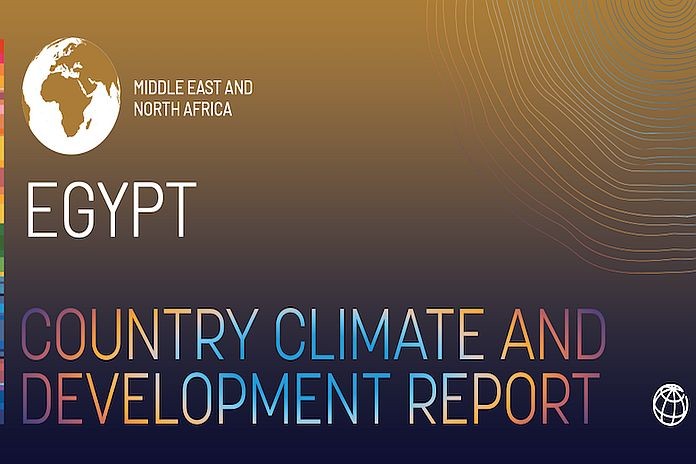SHARM EL-SHEIKH – Climate change impacts, including growing pressure on Egypt’s vital water supply, pose increased risk to the country’s long-term growth, says the World Bank Group’s Country Climate and Development Report (CCDR) launched here last night with the Government of Egypt. The report highlights that an ongoing commitment to climate action can transform these risks into opportunities and help Egypt to achieve its climate and development goals together.
The report identifies policy actions and investment opportunities that, if implemented within five years, could make the use and allocation of natural resources more efficient, reduce the impacts of climate change on people and businesses, and enhance Egypt’s competitiveness in global markets.
“Our CCDRs are shifting the discussion from distant impacts into immediate and actionable recommendations for decision makers today. The recommendations in this report are designed to build the foundation for a low-carbon growth model for Egypt with greater competitiveness in the global scene and reduced vulnerabilities of the people and the economy to climate shocks,” said David Malpass, World Bank Group president.
“Egypt has an ambitious strategy in place to combat the effects of climate change, and this report clearly shows that unlocking private sector investment will be key to reach the country’s targets,” said Makhtar Diop, IFC managing director. “Egypt is a strong partner of IFC in renewable energy and green finance. We remain committed to working together to implement the report’s findings.”
The report highlights the increasing unpredictability of the timing and volume of water available from the Nile River, which supplies more than 97 percent of Egypt’s freshwater. Even a slight change in rainfall can affect water availability and result in agricultural and employment losses.
Another challenge identified in the report is the high exposure of cities and coastal areas to rising seas, flooding, higher temperatures, air pollution and desertification. The growing urban population (an estimated 41.4 million new urban dwellers are expected over the next three decades) will put additional stress on services and deepen the exposure of assets and people to climate risks.
These climate risks will have a disproportionate impact on Egypt’s most vulnerable, with the number of people living on less than US$4 a day (the expected national poverty line) increasing by more than 9 million (0.8%) by the end of 2030 due to climate impacts. Longer-term, by 2060, the combined impact of climate change on the water supply, agriculture, air quality, and tourism could amount to between 2 and 6 percent of Egypt’s GDP, the report says.
Finally, the report points out that moving toward a low-emission development pathway can help Egypt to build economic resilience and strengthen its competitiveness. Although Egypt’s share of global emissions is estimated at only 0.6 percent, one of the lowest globally, emissions and economic growth are tightly interlinked. Three sectors in Egypt (energy, transport, and industry) account for around 80 percent of the country’s greenhouse gas emissions.
“The collaboration with the World Bank in the CCDR would further accelerate the implementation of the Egypt National Climate Change Strategy 2050 and Nationally Determined Contributions (NDC) 2030,” said Dr Mostafa Madbouly, Egypt’s prime minister.
Egypt, which is currently hosting COP27 in Sharm el-Sheikh, has already made important steps towards addressing climate change, pioneering green bonds in the MENA region, launching its 2050 Climate Change Strategy and providing updated targets for emission reduction by 2030. It has also launched the Country Platform for the Nexus of Water, Food, and Energy (NWFE) Program, designed to leverage multi-stakeholder partnerships to mobilize finance, provide technical assistance and catalyze private investment.
“The issuance of this report is of particular significance as we gather in Sharm El-Sheikh to discuss how to move from climate pledges to implementation,” said Dr Rania A. Al-Mashat, Egypt’s minister of international cooperation. “The CCDR outlines national efforts towards a green transition in key sectors such as water and agriculture, energy and industry, and resilient cities and coastal economies, while also identifying policy actions and investment opportunities. Towards that end, our new NWFE program is fully aligned with those objectives.”
“This report represents a model for further integrating development policies into national plans,” said Yasmine Fouad, Egypt’s minister of environment and COP27 Envoy. “Through national multi-disciplinary, sectoral consultation processes, the report provides prioritized adaptation and mitigation actions and points at the needed enabling environment, providing a road map which can support Egypt in achieving its ambitious climate goals.”
The report suggests a series of cross-cutting actions to further align Egypt’s development goals with its climate ambition. These include:
- Valuing natural resources like water and using and allocating them more efficiently. In cities, for example, by reducing current water loss from 29 to 20 percent, around 2 billion cubic meters of water could be saved annually.
- Strengthening information systems that share climate and hydrology-related information so that the government, firms and individuals can adapt better and faster to climate shocks and reduce risks. The cost-benefit ratio would be 1:9, meaning for every dollar spent building stronger information systems, nine dollars of potential losses could be averted.
- Focusing emission reductions on the transport, energy and industry sectors and laying the foundations for increased private sector participation by ensuring full implementation of the new Electricity and Renewable Energy Laws.
- Unlocking opportunities so that the private sector can more easily invest in areas such as low carbon municipal waste and water management, energy-efficient retrofitting of buildings, and green urban transport.
“We hope this report provides practical, workable solutions that align Egypt’s development goals with their climate ambitions. Boosting Egypt’s resilience to the impact of climate change is a key objective of our new country partnership,” said Marina Wes, World Bank country director for Egypt, Yemen, and Djibouti.






